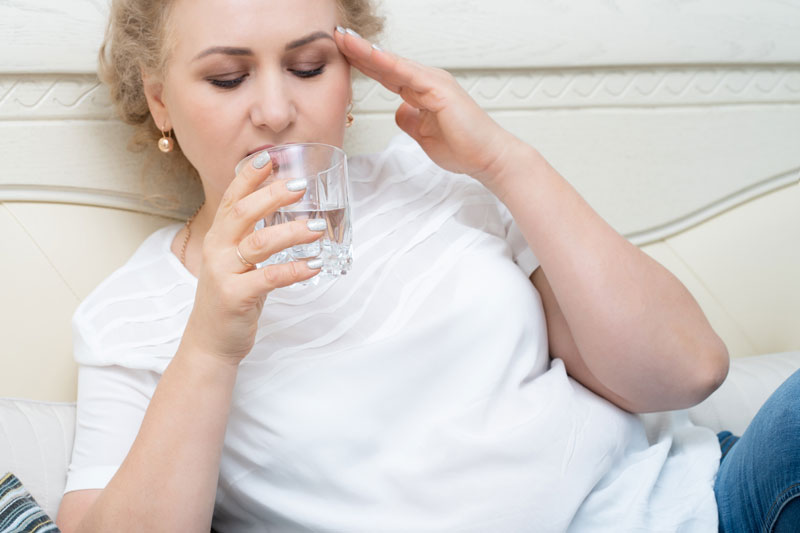What are hot flashes and how to distinguish them from just being hot?
Some women start getting hot flashes right after their hysterectomy, but mine started a year later. If you’re new to hot flashes, you may have trouble telling if it’s just you or if it’s hot around you.
This was true for me when my hot flashes first began. It took asking others if they were hot too or even checking the thermostat.
Hot flashes are common for menopausal women, but they can start immediately, if you’ve had a total hysterectomy. On the other hand, if you’ve had a partial hysterectomy (with one or both ovaries intact), you may start experiencing hot flashes and other menopausal symptoms sooner than you would have otherwise.
If you feel a sudden, intense heat, coupled with sweating that last a few seconds or minutes, it’s most likely a hot flash. The heat is isolated to your upper body (arms, chest, face and neck), rather than your whole body.
You may experience it a few times throughout the day or night (aka, night sweats), followed by chills, where you’re cold and shaky.
What my doctor suggested.
When I asked my doctor if there was a way to get rid of my hot flashes, she suggested hormone replacement therapy (HRT). She could place me on a low dose to see if it would minimize the incidents. I was surprised she didn’t share the side effects of HRT until I asked.
HRT is not right for everyone, she explained. It can increase blood clots and the likelihood of getting a stroke — but the risk is very low.
What she didn’t say, but I learned from additional research, was that HRT also increases your chance of developing breast cancer and heart disease.
Although there’s no evidence for this, some people believe HRT also leads to weight gain. No, thank you.
Steps I take to reduce and prevent hot flashes.
I’ve had trouble with hot flashes off and on. At one point, they were so bad that they made me nauseous. There were times I would have an attack in the middle of my workout. I’d feel faint and have to stop or slow down in between, waiting for it to go away.
I’ve tried a mixture of options to reduce my hot flashes and nowadays, prevent them altogether. The trick is, I have to be diligent and continue the process to keep my hot flashes at bay. I also have to be patient, as it may take a week or two for them to dissipate.
My eating window is important.
I’m a firm believer in intermittent fasting. When I set my eating (feasting) window to 4-6 hours on most days, my hot flashes seem to diminish. However, when I increase the window to 7 or more, the hot flashes return. I’m not saying that this works for everyone. In fact, it may be different for you.
When I end my fast is important.
I’m an early riser, so picking when I eat my last meal is also important for my hot flashes. I experimented with when to end my meals and found that eating my last meal two (preferably three) hours before bedtime reduced my hot flashes.
Supplement to combat hot flashes.
The National Library of Medicine conducted a study to test if magnesium supplements reduce menopausal hot flashes in breast cancer patients.
The women in their study took 400 mg of magnesium one to two times per day, and over half the women experienced less hot flashes. I wouldn’t suggest such a high dosage since the recommended dosage for women is between 310-320 mg per day. Taking more than 400mg per day can cause diarrhea.
I added a magnesium supplement, but you’ll want to find the right dosage for you.
Note: If you have any type of kidney disease, magnesium may be bad for you. It can also interfere with certain medications like blood pressure and water pills — so you’ll want to be careful before adding it to your diet and always consult your physician for their personalized medical advice.
What I eat and drink are important.
I love spicy foods and like to turn up the heat with cayenne pepper, jalapenos and hot sauce. I’m also impatient and sometimes eat hot foods before they’ve gotten a chance to cool. Unfortunately, this tends to trigger my hot flashes.
Some days, I just give in and bear the consequences later — but I’ve found that eliminating hot and spicy foods prevents my hot flashes as well.
Both alcohol and caffeine can trigger hot flashes. I personally don’t drink alcohol or coffee, but love decaffeinated teas. The tea, while decaffeinated, isn’t completely caffeine free, but I limit myself to one or two cups per day, which works for me.
In addition to taking magnesium supplements, I also add foods with magnesium to my diet. Some of these foods include spinach, poultry, oatmeal, salmon, almonds, brown rice, pumpkin seeds, black beans, kidney beans and cashews.
Regular exercise.
Exercising regularly keeps my hot flashes down. I work out roughly six times a week for 30-45 minutes. I’ve found that exercising, not only reduces my hot flashes but also improves my mood. To clarify, I’m not saying you should exercise for at least 45 minutes to reduce hot flashes. The operative words here are “regular exercise.”
Takeaway.
Consistency and mindfulness are key to reducing and even, preventing my hot flashes. When they return (as they sometimes do), retracing my steps helps me manage them naturally and effectively, without the need for meds.
If you’re struggling with hormonal imbalance and other menopausal issues, grab my free resource, 7 Surprising Ways to Balance Your Hormones & Blast Away the Pounds After a Hysterectomy.




 Why Journaling is Important
Why Journaling is Important



